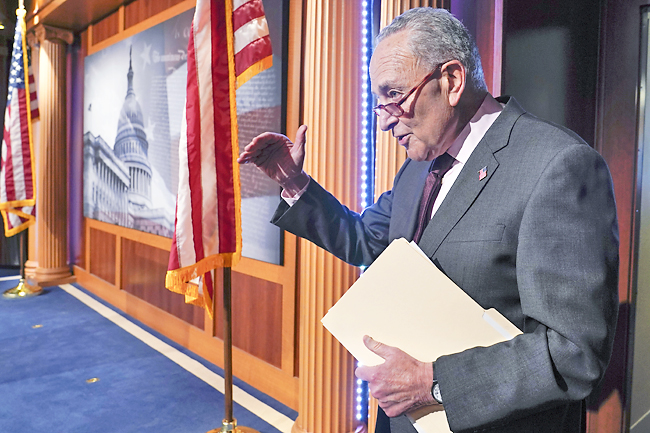WASHINGTON (AP) – United States (US) Democrats pared part of their proposed minimum tax on huge corporations and made other changes in their giant economic bill, Senate Majority Leader Chuck Schumer said on Friday, as they drove toward delivering a campaign-season victory to President Joe Biden on his domestic agenda.
In an unusual peek at closed-door bargaining, Schumer said Democrats dropped a proposed tax boost on hedge fund executives after pivotal centrist Senator Kyrsten Sinema said she would otherwise vote “no”.
Schumer said that in its place, the measure now has a new tax – which others said will be one per cent – on the shares companies buy back of their own stock, netting the government far more revenue.
“Senator Sinema said she would not vote for the bill” or even vote to let debate begin unless private equity tax was removed from the legislation, Schumer told reporters. “So we had no choice.”
He spoke a day after he and Sinema announced compromise revisions to the environment, health care and tax package. With final numbers still to be calculated, the overall measure raises over USD700 billion in revenue – including more robust IRS tax collections – using most of it for energy, climate and health initiatives and reducing federal deficits by USD300 billion.
The accord puts Democrats on the verge of a more modest yet striking resurrection of many of Biden domestic aspirations that appeal strongly to party voters.
Those include taxing big business, restraining prescription drug prices, slowing climate change, helping families afford private insurance and trimming federal deficits.

In another change, Schumer said a proposed 15-per-cent minimum tax on mammoth corporations had been trimmed and would now raise USD258 billion over the coming decade, down from USD313 billion.
That provision, which has been the legislation’s biggest revenue raiser, will now let those companies depreciate their equipment costs more quickly, lowering the government’s tax take and helping manufacturers who buy expensive machinery.
The new tax is expected to apply to around 150 companies with income exceeding USD1 billion.
Democrats plan for the Senate to begin considering the bill soon, and the House will return next Friday for votes. The measure is sure to face unanimous Republican opposition in the 50-50 Senate, where the backing of Sinema and all other Democrats will be needed for passage, along with Vice President Kamala Harris’ tie-breaking vote.
“This bill is a game changer for working families and our economy,” Biden said at the White House.
Still other revisions are possible. But the package passed one hurdle when the Senate parliamentarian, Elizabeth MacDonough, said a provision could remain requiring union-scale wages be paid if energy efficiency projects are to qualify for tax credits. She upheld another section limiting electric vehicle tax credits to those assembled in the United States (US) and containing batteries with minerals from countries with whom the US has free trade agreements.
“I’m especially pleased that our prevailing wage provisions were approved. These provisions guarantee wage rates for clean energy projects,” Senate Finance Committee Chairman Ron Wyden said early yesterday.
Democrats were awaiting the parliamentarian’s decision on other issues including requirements that pharmaceutical makers pay penalties if they raise prices above inflation for drugs patients get from private insurers.
Democrats are using special rules that let them overcome GOP opposition and pass the package without needing the 60 votes most bills require.


